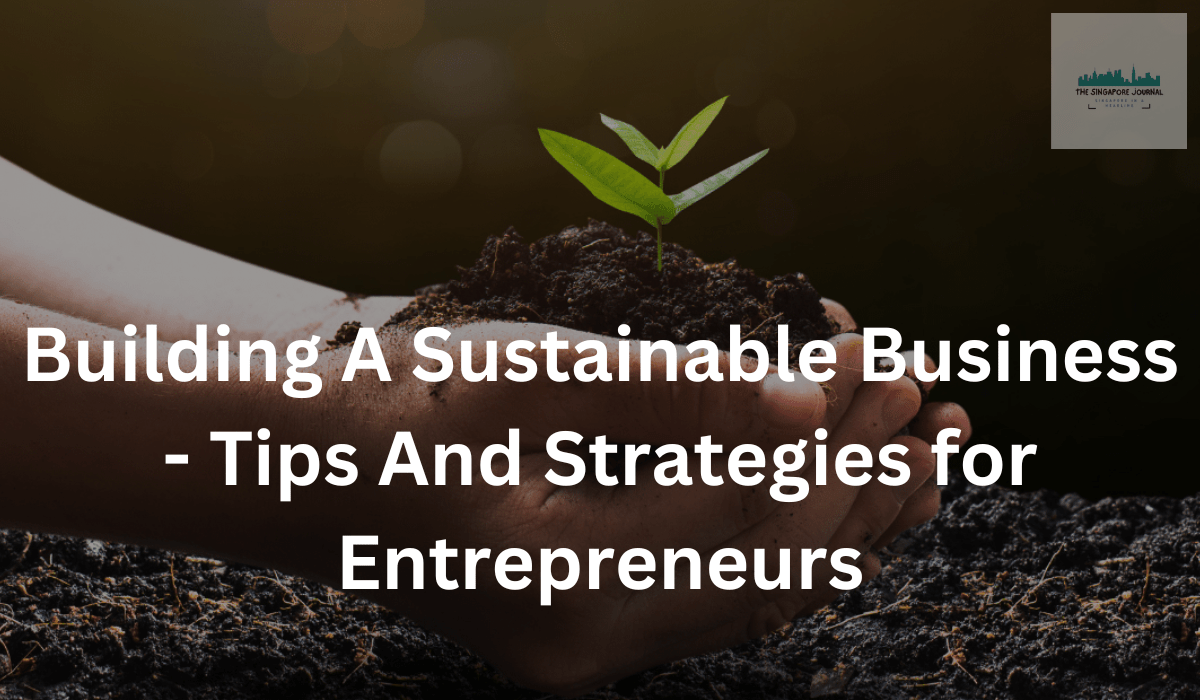Creating and growing sustainability in business is suitable for many reasons, and the chief among them is to live, work, and play on one planet, and we need to take care of it for the benefit of everyone. Most businesses need a deeper understanding of the business and sustainable development goals. Hence, from a broader perspective, a sustainable business is one whose actions and purpose are equally grounded in financial, environmental, and social concerns.
Building a sustainable business is a growing trend in today’s world as more and more entrepreneurs recognize the importance of creating a business that meets the needs of customers and stakeholders and considers its impact on the environment and society.
A sustainable business can continue operating long-term while minimizing its impact on the planet and humanity. This blog will discuss tips and strategies entrepreneurs can use to build a sustainable business.
Strategies that entrepreneurs can use to build a sustainable business.

1. Develop a clear sustainability mission statement
The first step in building a sustainable business is to develop a clear sustainability mission statement. This statement should reflect the entrepreneur’s commitment to sustainability and outline their goals and objectives for creating a more sustainable business. A clear mission statement will help guide the entrepreneur’s decision-making process and provide a framework for their sustainability efforts. Ensuring that the entire team is aware of and aligned with the sustainability mission is essential.
2. Conduct a sustainability audit
Once the sustainability mission statement is in place, the entrepreneur should conduct a sustainability audit of their business. The audit should identify areas where the company can reduce waste, increase efficiency, and decrease environmental impact. The audit will help the entrepreneur determine what changes must be made to become more sustainable. The audit should cover all aspects of the business, including energy consumption, waste generation, water usage, transportation, and supply chain management.
3. Embrace sustainable practices
Once the sustainability audit is complete, the entrepreneur should implement sustainable practices into every aspect of their business operations. This may include reducing energy consumption, minimizing waste, using eco-friendly products, and implementing sustainable supply chain practices. By embracing sustainable practices, entrepreneurs will reduce their environmental impact and save money on energy and waste disposal costs.
4. Educate employees
Employees play a crucial role in building a sustainable business. Entrepreneurs should educate their employees about the importance of sustainability and encourage them to reduce the company’s environmental impact actively. The entrepreneur should provide training on sustainability practices and offer incentives for employees who come up with innovative sustainability solutions. Employees engaged in sustainability efforts are more likely to be committed to the business’s sustainability goals.
5. Engage with the community
Building a sustainable business is not just about reducing the company’s environmental impact but also about building relationships with the community and stakeholders.
Entrepreneurs should engage with the community to build support for their sustainability efforts. This may involve participating in community events, collaborating with local sustainability organizations, and communicating regularly with customers and suppliers about their sustainability initiatives. Engaging with the community will help the entrepreneur build a reputation as a responsible business that cares about the environment and society.
6. Measure and track progress
It is essential to set goals for sustainability and regularly measure and track progress. This will help the entrepreneur identify areas for improvement and celebrate successes. Metrics such as energy consumption, waste reduction, and carbon footprint can be used to measure the company’s impact. By measuring and tracking progress, entrepreneurs can demonstrate their commitment to sustainability and make data-driven decisions about future sustainability initiatives.
7. Continuously improve
Building a sustainable business is an ongoing process. Entrepreneurs should continuously look for ways to improve their sustainability efforts. This may require investing in new technologies, partnering with suppliers who share their sustainability values, or seeking feedback from customers and stakeholders. Entrepreneurs should be open to new ideas and willing to change their sustainability practices as needed.
Is sustainability good for business?
Building a sustainable business is not just good for the environment and society; it is also suitable for business. By implementing sustainable practices, entrepreneurs can save money, build relationships with stakeholders, and improve their reputations. The tips and strategies discussed in this blog provide a framework for entrepreneurs to build a sustainable business, but a question still arises whether sustainability is suitable for companies. Then for that, entrepreneurs can focus on reducing their environmental impact by implementing sustainable practices such as:
1. Energy efficiency:
This can be achieved by using energy-efficient lighting, appliances, and equipment. It may also involve using renewable energy sources like solar or wind power.
2. Waste reduction:
This can be obtained by implementing recycling programs, using biodegradable or compostable products, and reducing packaging waste.
3. Water conservation:
This can be achieved by implementing water-saving technologies such as low-flow toilets and faucets, using drought-resistant landscaping, and collecting and reusing rainwater.
4. Sustainable supply chain management:
This involves working with suppliers who share the entrepreneur’s commitment to sustainability. This may include sourcing products from local suppliers, using environmentally friendly materials, and implementing fair labor practices.
5. Eco- friendly products:
This involves using environmentally friendly products that do not harm the planet. This may include using non-toxic cleaning products, eco-friendly packaging, and sustainable materials.
Entrepreneurs can also focus on social sustainability by
- Prioritizing diversity and inclusion: This involves creating a welcoming and inclusive workplace for all people, despite their background or identity.
- Supporting local communities: This involves supporting local businesses and organizations and investing in community development programs.
- Providing fair and ethical labor practices: This involves ensuring that employees are treated fairly and paid a living wage.
- Giving back to society: This involves philanthropy and corporate social responsibility initiatives that support causes such as education, health, and the environment.
Conclusion
Building a sustainable business requires a long-term commitment to environmental and social sustainability. Entrepreneurs can start by developing a clear sustainability mission statement, conducting a sustainability audit, and implementing sustainable practices. By continuously measuring and tracking progress and seeking ways to improve, entrepreneurs can build a sustainable business that benefits the environment, society, and their bottom line.
Also Read:

